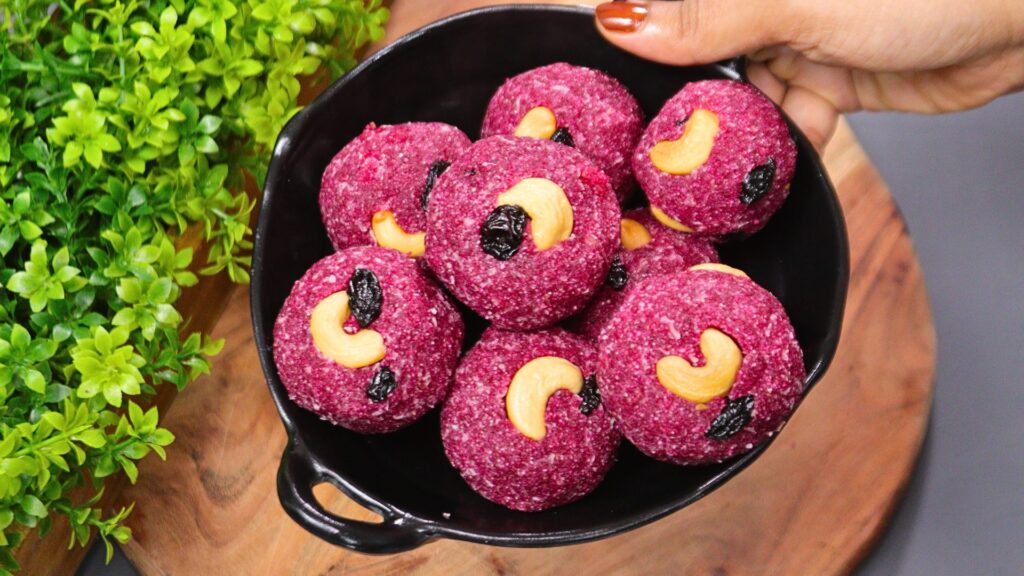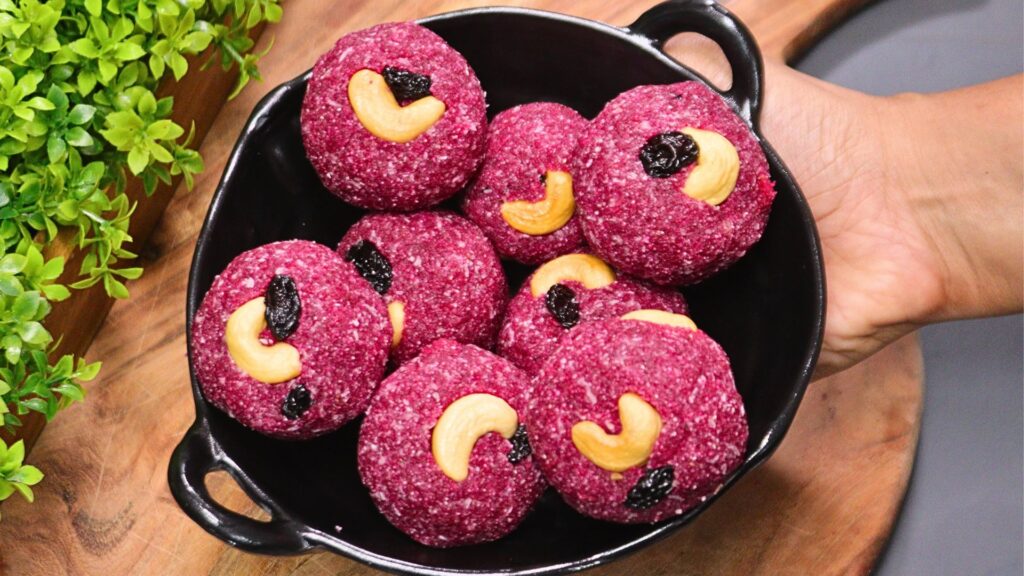



Beetroot laddus are a delightful fusion of traditional Indian sweets with the nutritional richness of beetroot. These vibrant pink laddus not only appeal to the eyes but also pack a punch of health benefits, making them an excellent choice for those who want to indulge in sweets without compromising on nutrition. In this article, we will delve into the ingredients, the health benefits of each component, and why beetroot laddus should be a part of your dessert repertoire.

Beetroot, the star ingredient in beetroot laddus, is a root vegetable renowned for its deep red color and earthy flavor. But beetroot is much more than just a pretty face; it's a nutritional powerhouse loaded with essential vitamins, minerals, and antioxidants. Rich in dietary fiber, folate, manganese, potassium, and iron, beetroot supports various bodily functions, making it an excellent addition to any diet.
One of the most significant health benefits of beetroot is its ability to improve blood circulation. Beetroot contains high levels of nitrates, which the body converts into nitric oxide, a compound that relaxes blood vessels and improves blood flow. This process can help lower blood pressure, reduce the risk of cardiovascular diseases, and enhance athletic performance by increasing oxygen delivery to the muscles.
Beetroot is also a potent source of antioxidants, particularly betalains, which give it its vibrant color. These antioxidants help combat oxidative stress and inflammation in the body, potentially reducing the risk of chronic diseases such as heart disease, cancer, and diabetes. Additionally, the fiber content in beetroot promotes digestive health by aiding in regular bowel movements and supporting a healthy gut microbiome.
Semolina, another key ingredient in beetroot laddus, is a coarse flour made from durum wheat. It is commonly used in various culinary preparations, especially in Indian cuisine, where it is known as "rava" or "sooji." Semolina is an excellent source of complex carbohydrates, providing a steady release of energy, making it ideal for sustaining energy levels throughout the day.
Ghee, a type of clarified butter, has been a staple in Indian cuisine for centuries. It is highly revered in Ayurvedic medicine for its health benefits and is considered a superfood. Ghee is made by simmering butter to remove the milk solids and water, leaving behind pure butterfat. This process not only enhances its flavor but also extends its shelf life.
Ghee is rich in healthy fats, particularly short-chain and medium-chain fatty acids, which are easily digestible and provide a quick source of energy. These fats are also beneficial for the absorption of fat-soluble vitamins (A, D, E, and K) and other nutrients from the food we eat. Unlike many other fats, ghee is lactose-free, making it suitable for individuals with lactose intolerance.
One of the unique properties of ghee is its ability to support gut health. Ghee contains butyrate, a short-chain fatty acid that nourishes the cells of the gut lining, promotes the growth of beneficial gut bacteria, and reduces inflammation in the digestive tract. This makes ghee an excellent choice for individuals with digestive issues or inflammatory bowel diseases.
Cashew nuts, with their creamy texture and rich flavor, are not only a delicious addition to beetroot laddus but also bring a host of health benefits. Cashews are packed with healthy fats, primarily monounsaturated and polyunsaturated fats, which are known to support heart health by reducing bad cholesterol levels and increasing good cholesterol.
They also provide an array of essential nutrients, including magnesium, phosphorus, copper, and manganese. Magnesium is particularly important for muscle and nerve function, blood sugar control, and bone health.
Black raisins, another ingredient in beetroot laddus, are dried grapes that add natural sweetness and a chewy texture to the laddus. They are rich in natural sugars, making them a healthier alternative to refined sugar, and are also packed with essential nutrients, including fiber, vitamins, and minerals.
One of the key benefits of black raisins is their high antioxidant content. Black raisins are also a good source of iron, which is essential for the production of red blood cells and the prevention of anemia. Additionally, they provide a decent amount of dietary fiber, which supports digestive health by promoting regular bowel movements and preventing constipation.

Desiccated coconut, which is dried and grated coconut meat, adds a pleasant texture and flavor to beetroot laddus. It is a rich source of healthy fats, particularly medium-chain triglycerides (MCTs), which are easily absorbed and used by the body for energy. These fats have been shown to promote weight loss by increasing feelings of fullness and boosting metabolism.
Beetroot laddus are a perfect example of how traditional sweets can be transformed into a nutritious and healthful treat. By incorporating ingredients like beetroot, semolina, ghee, nuts, and spices, these laddus not only satisfy your sweet tooth but also provide a range of health benefits.